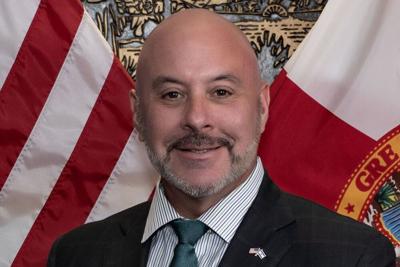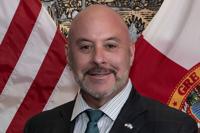
Florida Chief Financial Officer Blaise Ingoglia
Progressive Insurance is poised to refund its Florida auto insurance customers nearly $1 billion at the end of 2025, as a result of state regulations that bar auto insurers from earning excess profits from policies, Florida officials reported last week.
The increasing profitability of insurers doing business in Florida’s auto and property insurance markets is due to recent insurance and tort reforms that have attracted new insurance carriers into the Florida market, reduced litigated insurance claims and lowered rates, Florida Gov. Ron DeSantis and Insurance Commissioner Mike Yaworsky said during a press conference.
In a federal Securities Exchange Commission filing in October, Progressive reported that since early 2023, when insurance reforms were enacted in Florida, the company has experienced lower losses on certain types of personal auto insurance claims.
“Despite actions to lower rates in the last year, it is probable that our personal auto profit in Florida for the 2023-to-2025 period will exceed the statutory profit limit that a Florida statute imposes on the profit that any insurance group can earn on personal auto insurance over any three-calendar-year period,” the filing states. “In such event, we would need to credit any profit above the limit to all Florida personal auto policyholders active at Dec. 31, 2025.”
The current estimate is that the company would have to credit its 2.7 million auto policyholders in Florida $950 million in excess profits by the end of the year, according to the filing.
DeSantis said in a prepared statement that rates for both auto and property insurance are declining, along with frivolous litigation.
“This year, Florida’s top five auto insurers are averaging over a 6% rate reduction, and we've secured nearly $1 billion in credits for Progressive auto policyholders – and the other carriers are expected to follow suit soon,” DeSantis said. “Also, 17 new companies have entered the homeowners’ market, 33 companies have filed for rate decreases and reinsurance market rates have declined.”
Based on a 2007 state law, the Florida Office of Insurance Regulation (OIR) has the authority to order refunds from property insurers, but the threshold for determining excessive profits from providing property insurance differs from that of auto insurance, OIR spokesman Shiloh Elliott said.
“Since the enactment of that law, OIR has not ordered a refund of excess profits for a property insurer,” Elliott told the Florida Record in an email. “While it would be difficult to predict whether such a scenario may occur in the near future, the situation with Progressive suggests that market conditions are improving and could become favorable for similar developments in the property insurance sector.”
At the close of 2024, Florida property insurers reported $954 million in net income, reflecting a $292 million increase over the previous year, according to the Governor’s Office. In contrast, in 2022, property insurers sustained $741 million in losses.
While 33 property insurers have requested lower rates in OIR filings since January of last year, 46 property insurers sought no changes in rates over the same time period, the Governor’s Office reported.
“It’s a good day when the insurance companies are the ones sending the checks to the policyholders instead of receiving checks from policyholders,” the state’s chief financial officer, Blaise Ingoglia, said in a statement. “I have said since day one that I will fight for the policyholders, not insurance companies or trial attorneys.”




